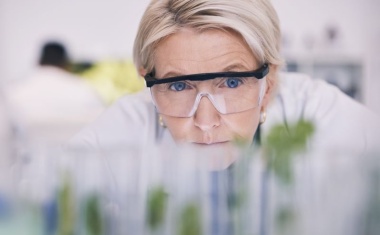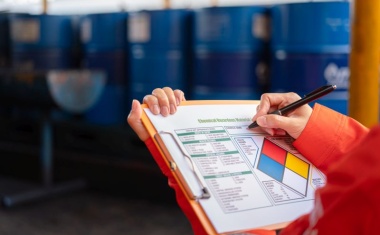Arxada was created in 2021 following the carve-out and sale of Lonza Specialty Ingredients to private equity firms Bain Capital and Cinven. The Swiss specialty chemicals company achieved sales of CHF 2 billion in 2023 in its two businesses, Microbial Control Solutions (MCS) and Nutrition, Care & Environmental (NCE), which focus on multiple end-markets such as Human Health & Nutrition, Home & Personal Care, Paints & Coatings and Wood Protection. Michael Reubold spoke with Olivier Lambrechts, executive leadership team member and president NCE at Arxada, about the plans and vision for the future, and current CDMO market trends.

CHEManager: After the businesses were carved out from Lonza and Arxada was established in 2021, how has independence transformed the company since?
Olivier Lambrechts: In our first year, we focused heavily on building Arxada as an independent company, focusing on establishment as a player in the chemical industry and setting up best practices to serve our customers in an agile and flexible way. We also made two key acquisitions, Troy Corporation and Enviro Tech, which allowed us to offer customers an even broader portfolio of microbial control solutions and performance additives. We expanded our global supply chain capabilities, improving operations, supplying ability and other efficiencies that benefit our customers.
What do the company’s owners, Bain Capital and Cinven, expect from you in terms of further development?
O. Lambrechts: Bain Capital and Cinven are investors with a long-term commitment to Arxada’s success. The expectation is for our business to focus on growth through sustainable innovations. In our Microbial Control business, these innovations will allow us to lead a transition towards more sustainable products that meet or exceed regulatory changes and global macrotrends towards more eco-friendly microbial control. For our NCE business, it means building upon our strong CDMO capabilities and using them to provide low carbon footprint solutions to our customers. Sustainability is key for our owners. In fact, Arxada’s financing includes a sustainability-linked bond, the first of its kind. This founding principle guides us as we plan and invest in our sustainability strategy and help our customers adapt to meet their own sustainability goals.
Arxada’s roots go back more than 120 years. Having such a heritage of innovation and technology, what would you define as your key differentiators in the CDMO market today?
O. Lambrechts: Our more than 100-year history is most visible at our manufacturing site located in Visp, Switzerland. The Visp site is extremely well invested and offers an unparalleled level of vertical integration into chemical building blocks that no other company can provide. We have on-site production of ethylene and acetylene through an efficient and compact acetylene generating unit. Additionally, we can produce other base building blocks including complex and sophisticated molecules such as ketenes and diketenes as well as hydrogen cyanide. The latter is unique in the Western world given the complexity of producing and safely handling these molecules.
This vertical integration combined with our multipurpose assets enables us to provide a flexibility to our customers that no one else can offer. Depending on customer needs, Arxada has the capability to: 1) tailor towards more cost competitive solutions through a leaner supply chain 2); protect from supply chain disruptions by foregoing the need to source molecules from overseas; 3) provide low carbon footprint solutions through the usage of green electricity and feedstock combined with mass balancing through our vertically integrated assets. For some customers, it’s a combination of all three value propositions!

How have the rules of the CDMO market changed based on the lessons learnt in the pandemic years of 2020/21? Have customer requirements like cost, quality, trust, supply reliability, time to market or sustainability shifted?
O. Lambrechts: We absolutely see a strong interest from our customers to increase supply reliability. This was driven by the supply disruptions during Covid and more recently by the Red Sea issues. We anticipate it will only be exacerbated by increasing geopolitical tensions. Sustainability is equally gaining in importance not only by public pressure, but by regulations. We notice that customers appreciate a partner like Arxada who enables them to bring demonstrable sustainability claims that are grounded in scientific reality.
“We see a strong interest from our customers to increase supply reliability.”
In 2021 Arxada acquired two companies — Troy and Enviro Tech. What have they added to the NCE division in particular in terms of chemistries and technologies?
O. Lambrechts: As previously mentioned, the acquisitions of Troy and Enviro Tech were strategic moves aimed at expanding our market reach and technology portfolio in microbial control. Recognizing that microbes are omnipresent wherever there’s water, our solutions span a wide array of industries, from paints and coatings to personal care and healthcare. Troy gave us access to new markets, particularly in paints and coatings, where our microbial control technologies could be applied. Enviro Tech introduced a new technology that we could scale across various industries. These acquisitions underscore Arxada’s unique position in the market, being one of the few companies on our scale capable of serving multiple industries with a broad range of technologies. Our NCE division’s capabilities provide opportunities to leverage manufacturing assets and explore other companywide synergies between the two business units.
What role within the company does the NCE business play today in terms of revenues and growth potential?
O. Lambrechts: NCE represents roughly a third of Arxada’s revenues and is an essential contributor to the company’s overall growth strategy. Arxada sees the combination of both divisions as highly relevant to provide a robust platform for growth grounded in global macrotrends. In the case of MCS, it is protecting the world from the harmful impacts of ever-evolving microbes. In the case of NCE, we are looking to provide supply reliability in a more sustainable manner through low carbon footprint solutions, renewables and battery materials.
Do you have plans to further develop your technology toolbox, capabilities or capacities and/or participate in the consolidation of the CDMO sector?
O. Lambrechts: Based on our current project portfolio, we have a growth strategy lined up for the Visp site which involves expansion of chemical capabilities and capacity additions. While we do not rule out further consolidation, our primary focus is on delivering the solutions our customers need today and building on our strong backbone in Visp for chemical specialties and biotech projects at our Kourim site in the Czech Republic.
In which customer markets do you expect the biggest growth in the years to come? What are the main growth drivers and how do you support growth in these areas?
O. Lambrechts: We expect significant growth in nutritional ingredients as well as battery materials . The main growth drivers are increased global population and consumer trends for more sustainable nutrition as well as a growing demand for renewable energy — and associated need to store that energy — on the other hand.
“We expect significant growth in nutritional ingredients as well as battery materials.”
Do you expect the outsourcing trend, that started in the pharma sector to continue and gain momentum also in other areas important for the NCE business?
O. Lambrechts: Indeed, we observe that our customers are increasingly focusing on leveraging their core capabilities and proximity to the end markets to innovate, market and sell their solutions while relying on Arxada as a partner to quickly scale up and reliably manufacture their products. This partnership enables them to be agile, asset-light and benefit from working with a partner enjoying the benefit of 100+ years of experience to deal with the manufacturing of complex and not always easy to handle chemistries.
Many corporations have announced ambitious net-zero goals, some even excelling the net-zero targets of nations‘ governments. What is Arxada’s approach to support customers in reducing their carbon footprint?
O. Lambrechts: Arxada helps customers reduce their carbon footprint by the unique combination of three things. First, the deep vertical integration enables Arxada to directly use green feedstock for its acetylene generating unit as well as other core production assets. Second, through its location in Switzerland, Arxada can enjoy easy access to green energy. Finally, our sourcing team is highly experienced in identifying and working with partners to offer low-carbon footprint materials where we cannot directly produce the molecules in-house. Combined, this is Arxada’s unique value proposition











